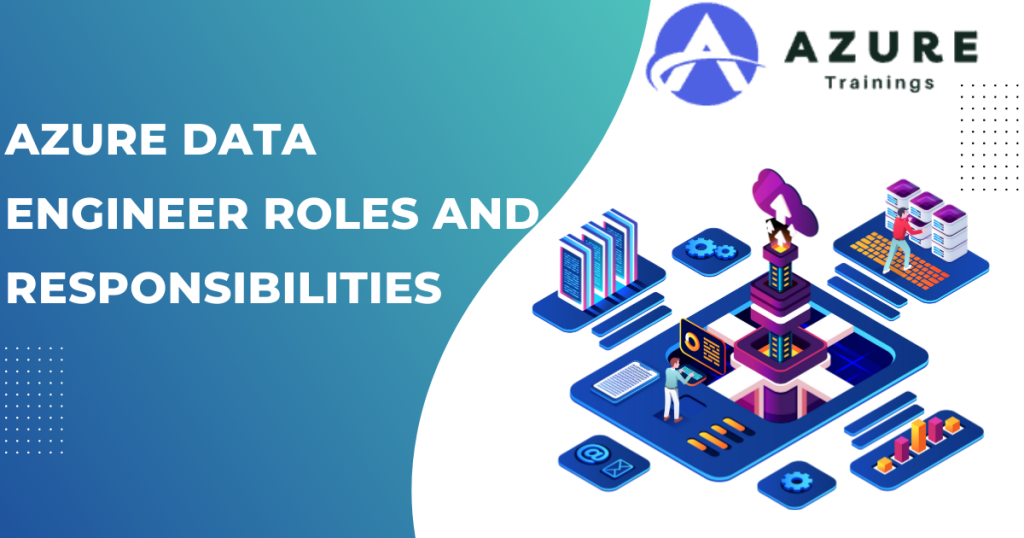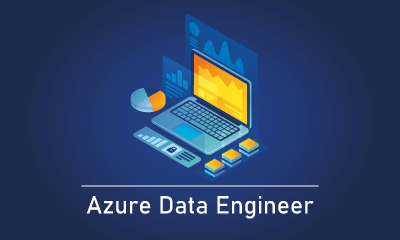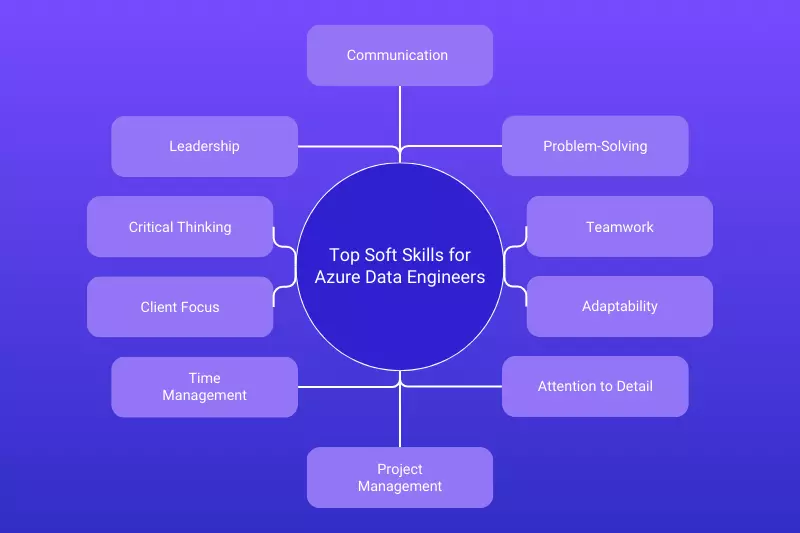Azure Data Engineer Roles and Responsibilities

Brief Overview of Roles and Responsibilities an Azure Data Engineer
Roles:
- Data architect : Design an effective and sustainable data system that meets the needs of the organization.
- ETL Developer: Build the process of Extract, Transform, and Load (ETL) data for analysis.
- Cloud specialist: Design, implement and maintain data pipelines and data repositories on the Azure cloud.
- Big Data Engineer: Process and analyze data at scale using Azure tools including Databricks.
- Security and Compliance: Develop data governance procedures and ensure security compliance.
Responsibilities:
- Design And Maintain Data Pipelines: Build processes that enable the access to and flow of information while integrating and transforming data.
- Manage Data Security: Implement encryption, role based access control (RBAC), and compliance policies.
- Work With Other Teams: Provide stakeholders with processed and usable data for business decision making.
- Monitor Data Performance: Optimize data workflows and troubleshooting activities using Azure Monitor.
Topics covered:
Additional resources:
- As the total amount of data processed by businesses develop, so does the demand for talented data engineers.
- In particular, there is a growing need for data engineers proficient in Azure, Microsoft’s cloud computing platform.
- If you want to specialize in Azure as an aspiring data engineer, you should first grasp the tasks and responsibilities of an Azure data engineer. This article will thoroughly overview the major tasks and abilities necessary for this position.

What is Azure Data Engineering?
- Azure Data Engineering is a specialized field that involves designing, implementing, and maintaining data management systems on the Azure cloud platform.
- It is a critical aspect of modern businesses that generate massive amounts of data and require efficient ways to store, process, and analyze it.
- Azure Data Engineering covers a range of tasks, including data modeling, data integration, data storage, and data processing.
- You will be responsible for creating and handling scalable data pipelines, assuring data quality, and maximizing data processing performance as an Azure data engineer.
- You will also work closely with other teams, such as data analysts, data scientists, and software developers, to provide them with the data they need to perform their job functions.
- Azure Data Engineering requires technical skills and effective communication and collaboration.
- You must have a strong data management foundation and specialized skills in Azure cloud computing.
- Some essential skills for this job include proficiency in SQL and other data query languages, experience with Azure data storage solutions, knowledge of data integration tools, familiarity with data processing frameworks, understanding of data modeling and schema design principles, ability to work with large datasets and perform data analysis, and strong problem-solving and troubleshooting skills.
Key Responsibilities of Azure Data Engineers
The key responsibilities of an Azure data engineer include the following:
Designing and implementing data storage solutions on Azure
- One of the primary responsibilities of an Azure data engineer is to design and implement data storage solutions on Azure.
- That includes selecting the appropriate Azure data storage services for the specific use case, such as Azure SQL Database, Azure Cosmos DB, or Azure Data Lake Storage.
- The data engineer must also design the data storage schema and ensure it is optimized for the specific use case.
Building and maintaining data pipelines for data integration and processing
- Another key responsibility of an Azure data engineer is to build and maintain data pipelines for data integration and processing.
- Accordingly, data is collected from various sources, transformed into a practical format, and loaded into the appropriate data storage solution on Azure using tools such as Azure Data Factory and Azure Databricks.
- The data engineer must also ensure the data pipeline is scalable and efficient.
Ensuring data quality and accuracy through testing and validation
- Data quality and accuracy are critical to the success of any data management system.
- As an Azure data engineer, you must ensure that the data stored and processed on Azure is highly accurate.
- It involves testing and verifying the data at different phases of the data pipeline, from extraction through loading.
Optimizing data processing performance through tuning and monitoring
- Data processing performance is another critical aspect of Azure data engineering.
- The data engineer must ensure the data processing is efficient and scalable by tuning the data pipeline and monitoring performance.
- That involves identifying and resolving bottlenecks in the data pipeline and optimizing the data processing algorithms.
Developing and maintaining data models and schemas
- Data modeling and schema design are important aspects of Azure data engineering.
- The data engineer must develop and maintain data models and schemas optimized for the specific use case.
- That involves selecting the appropriate data modeling techniques and ensuring the data schema is scalable and efficient.
Collaborating with other teams to provide data for analytics and reporting
- As an Azure data engineer, you will work closely with other teams, such as data analysts, data scientists, and software developers, to provide the data they need to perform their job functions.
- That involves understanding the specific data requirements of each team and ensuring that the data is available in the appropriate format and location on Azure.
Ensuring data security and privacy prerequisites are followed
- The security and privacy of knowledge are important elements of any information management system.
- The data engineer oversees ensuring that the data stored and processed on Azure conforms with applicable data security and privacy requirements, such as HIPAA and GDPR.
Essential Skills for Azure Data Engineers

- To succeed as an Azure data engineer, you must have a strong data management foundation and specialized skills in Azure cloud computing.
- Some essential skills for this job include:
Proficiency in SQL and other data query languages
- SQL is critical for any data engineer, including those working with Azure. You should be proficient in SQL and other data query languages like T-SQL and PL/SQL.
Experience with Azure data storage solutions such as Azure SQL Database, Azure Cosmos DB, and Azure Data Lake Storage
- As an Azure data engineer, you will work with various Azure data storage solutions such as Azure SQL Database, Azure Cosmos DB, and Azure Data Lake Storage.
- You should have experience with these services and be able to select the appropriate service for the specific use case.
Knowledge of data integration tools such as Azure Data Factory and Azure Databricks
- Data integration remedies like Azure Data Factory and Azure Databricks are vital to the success of any Azure data management system.
- You should know these tools and be able to use them to build and maintain data pipelines.
Familiarity with data processing frameworks such as Apache Spark and Hadoop
- Apache Spark and Hadoop data processing methods are also vital for Azure data engineers.
- You should be familiar with these frameworks and be able to use them to optimize data processing performance.
Understanding of data modeling and schema design principles
- Data modeling and schema design are important aspects of Azure data engineering.
- You should understand data modeling and schema design principles and be able to develop and maintain data models and schemas optimized for the specific use case.
Ability to work with large datasets and perform data analysis
- As an Azure data engineer, you will work with large datasets and perform data analysis.
- You should be able to work with large datasets and perform data analysis using tools such as Azure Machine Learning.
Strong problem-solving and troubleshooting skills
- Strong problem-solving and troubleshooting skills are critical for Azure data engineers.
- You should be able to identify and resolve issues in the data pipeline and optimize data processing performance.
Diverse Perspectives on Azure Data Engineering
- Azure Data Engineering is a rapidly growing field, with many different perspectives on what it takes to succeed in this role.
- Some experts emphasize the importance of strong technical skills, while others stress the need for effective team communication and collaboration.
- One perspective is that Azure data engineers need to deeply understand the Azure cloud platform and its various data management services.
- That includes knowledge of Azure SQL Database, Azure Cosmos DB, and Azure Data Lake Storage, as well as data integration tools such as Azure Data Factory and Azure Databricks.
- They should also be familiar with data processing frameworks such as Apache Spark and Hadoop.
- Another perspective is that Azure data engineers must be effective communicators and collaborators.
- They should be able to work closely with other teams, such as data analysts, data scientists, and software developers, to provide the data they need to perform their job functions.
- Additionally, they should be able to explain complex technical concepts to non-technical stakeholders.
Relevant Statistics on Azure Data Engineering
- According to a survey conducted by Microsoft, there is a growing demand for data engineers with Azure skills.
- 42% of organizations plan to hire more data engineers in the next 12 months, and Azure is the most in-demand cloud platform for data engineering jobs.
The same survey also found that the top three skills required for Azure data engineering roles are:
- Proficiency in SQL.
- Experience with Azure data storage solutions.
- Knowledge of data integration tools.
Thee highlights the importance of having a strong foundation in these areas if you want to pursue a career in Azure Data Engineering.
- As per reports that the average salary for an Azure data engineer in the United States is $126,000 per year, with salaries ranging from $90,000 to $170,000 per year, depending on experience and location.
- That is a highly competitive salary range, which reflects the high demand for skilled Azure data engineers.
- The statistics show that Azure Data Engineering is a growing field with a strong demand for skilled professionals. Suppose you’re interested in pursuing a career in this field.
- In that case, developing the necessary skills and staying up-to-date with the updated trends and technologies in Azure cloud computing is important.
Conclusion
- Azure Data Engineering is a challenging and rewarding field that needs a combination of technical skills and effective communication and collaboration.
- As an aspiring Azure data engineer, it is necessary to understand the key responsibilities and skills required for this job and the diverse perspectives and relevant statistics in the field.
- By building a strong foundation in data management and Azure cloud computing, you can position yourself for success in this growing field.
FAQ'S about Azure Data Engineering Roles and Responsibilities
Azure Data Engineering is a specialized field that involves designing, implementing, and maintaining data management systems on the Azure cloud platform.
The key responsibilities of an Azure data engineer include designing and implementing data storage solutions, building and maintaining data pipelines, ensuring data quality and accuracy, optimizing data processing performance, developing and maintaining data models and schemas, collaborating with other teams to provide data for analytics and reporting, and ensuring compliance with data security & privacy regulations.
Some essential skills for Azure data engineers include proficiency in SQL and other data query languages, experience with Azure data storage solutions, knowledge of data integration tools, familiarity with data processing frameworks, understanding of data modeling and schema design principles, ability to work with large datasets and perform data analysis, and strong problem-solving and troubleshooting skills.
Some of the most commonly used Azure data storage solutions include Azure SQL Database, Azure Cosmos DB, and Azure Data Lake Storage.
Some commonly used data integration tools for Azure data engineering include Azure Data Factory and Azure Databricks.
Some commonly used data processing frameworks for Azure data engineering include Apache Spark and Hadoop.
There is a growing demand for data engineers with Azure skills. According to a survey conducted by Microsoft, 42% of organizations plan to hire more data engineers in the next 12 months, and Azure is the most in-demand cloud platform for data engineering jobs.
According to a survey, the average salary for an Azure data engineer in the United States is $126,000 annually, with salaries ranging from $90,000 to $170,000 per year, depending on experience and location.
Managing big and complicated data pipelines, guaranteeing data quality and correctness, enhancing data processing performance, and ensuring compliance with data security and privacy standards are all frequent difficulties for Azure data engineers.
To become an Azure data engineer, you must have a strong data management foundation and specialized skills in Azure cloud computing. You can gain these skills through education and training programs, such as online courses, certifications, and hands-on experience with Azure data engineering projects.
